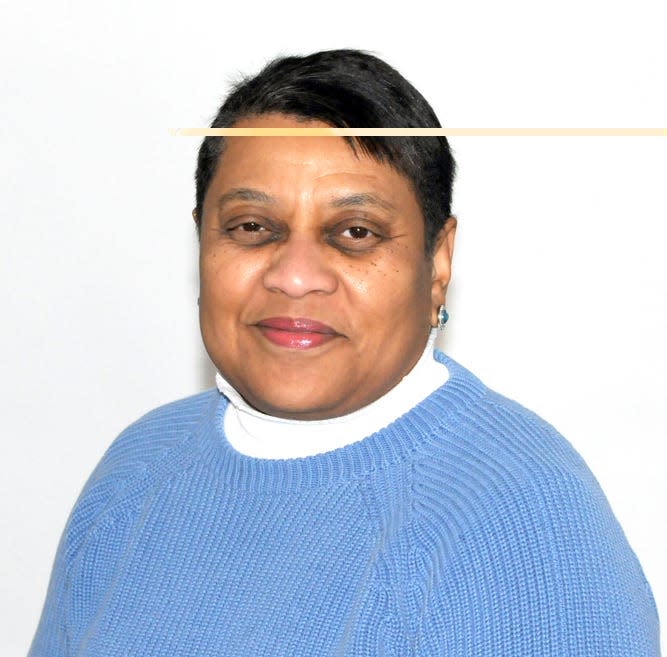Charita Goshay: Americans must reject religious extremism as Lincoln, Founders did

- Oops!Something went wrong.Please try again later.
During his presidency, Abraham Lincoln met with several pastoral delegations, including one from Ohio that tried to press him into endorsing a change in the Constitution to include the mention of Jesus.
The president who counted clergy among his close friends − Quakers in particular − had an affinity for Ohio, having tried numerous court cases in Columbus and Cincinnati. He even visited Alliance in 1861 while traveling to his inauguration, and would grow to rely on the state that produced Gens. Ulysses Grant and William Tecumseh Sherman and more Union Army generals than any other.
Lincoln declined the Ohio pastors' proposal with diplomacy and a patience that sometimes exasperated his cabinet. He did once toy with the idea of proposing a "God amendment" during his 1863 State of the Union Address before his gobsmacked cabinet knocked it down, bringing the pragmatic politician to his senses.
Religious pluralism is the American way One nation, under one religion? Stark clergy say no
Lincoln's faith in God helped to sustain him through personal tragedy and through this nation's greatest crisis. It's entirely possible that his relationships with people of faith, most of whom were abolitionists, may have helped to move him from his political ambivalence about slavery, to doing something about it.
In public, Lincoln frequently invoked the Almighty but never imposed his beliefs or made a spectacle of them. He had the courage to express doubt, and posed the still-unanswered question: How can a just God be on the side of both the Union and the Confederacy?
Lincoln's brand of faith can be traced directly to the Founders, a blend of Christians and Deists who made the conscious decision to create a Constitution devoid of religious edicts. Author James Madison was determined that America would not experience the same fate that befell Europe; its ground soaked in blood from religious wars.
Yet, after 248 years and 46 presidents, we find ourselves confronted with the prospect of Christian nationalism and its practitioners' insistence that America is a "Christian" nation, rather than a nation which enshrines and protects a person's choice to practice Christianity − or not.
There is no doubt that America's culture, morals and laws have been influenced and shaped by religious tenets and despite what some argue, there is room for religious expression in the public square.
The problem rests with imposition.
There are those who are insisting that their particular brand of Christianity must be the only prism by which laws are created and enacted. When others disagree, it's spun as anti-God and treasonous and an attack on all that is good about America.
It's an ideology fed by a sense of victimhood rather than servanthood; one which is pushing for a forced marriage between religion and government.
The belief by some that there should no daylight between government and their particular brand of Christianity runs deep. Long before our founding, Massachusetts Bay Colony Puritans said to be in search of religious freedom prohibited Christmas celebrations and fined people for skipping church.
We must be more vigilant: What's that bump in the night? It's democracy, stumbling
In 2024, Christian nationalism is more than just set of a beliefs, it's a bonified political movement buoyed by acolytes who salt the ground with resentment and fear even as American churches empty out. It makes no pretense of political neutrality, but rather is clear in its goal to dominate government at all levels.
While Christian nationalism might sound like a panacea for a country going through growing pains, at some point, your faith won't be good enough, either.
Monday marks the 159th anniversary of Lincoln's assassination by John Wilkes Booth, who was infuriated by the Confederates' defeat and the president's support of Black men eventually acquiring the vote because they fought for it.
The grief was so widespread, the moment became known as "America's funeral." His funeral train was greeted by thousands of Ohioans as it passed through through Cleveland and Columbus en route to his burial in Springfield, Ill.
There is an aura of sadness that envelopes you when you enter Lincoln's tomb. Perhaps it is sorrow and regret from the millions of Americans who have passed through, and knowing what might have been, and wondering why it is that the good among us seem to leave us so soon.
Charita M. Goshay is a Canton Repository staff writer and member of the editorial board. Reach her at 330-580-8313 or charita.goshay@cantonrep.com. On Twitter: @cgoshayREP
This article originally appeared on The Repository: Americans must heed the example set by Lincoln and founding fathers

